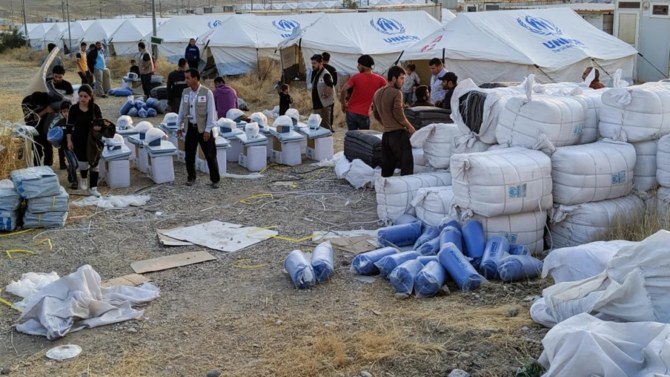
NNA – Caretaker Minister of the Displaced, Issam Sharafeddine, visited today the Syrian state, accompanied by a Lebanese Democratic Party delegation, where they met with the Minister of Local Administration and Environment, Hussein Makhlouf, in charge of the displaced Syrians’ dossier, and Interior Minister, Major General Mohammad al-Rahmoun. Talks centered on the plan set by Minister Sharafeddine to ensure a safe, dignified and voluntary return of the displaced Syrians to their homes, and the measures taken by the Syrian side to provide a safe and quick return for them according to specific timetables agreed upon by both sides.
Makhlouf confirmed in a statement after the meeting, that “there is a consensus in the vision between the Syrian and Lebanese sides regarding the return of all refugees, not just 15,000 displaced persons per month, as stated in the plan presented by the Lebanese side,” noting that “the amnesty decrees that were issued included all Syrians, in addition to facilitating and simplifying procedures in the border areas and providing services for returnees, including transportation, relief, humanitarian aid, medical care, education and others, to provide them with a safe and comfortable stay.” “One of the priorities of the Syrian state is to create conditions for the return of all Syrians to their homes and to rehabilitate the infrastructure in the areas liberated by the Syrian Arab Army,” Makhlouf asserted. He added: “What the state has done in this context allowed the return of five million displaced Syrians, including one million displaced from abroad and four million from the inside…They have become stable in their areas with full services being provided.” “Syrians in Lebanon and in any other country are invited to return,” Makhlouf reiterated. He called on the United Nations organizations to be “an active partner in the return of the displaced, especially that the Syrian side is open to cooperation with the Lebanese side and others to facilitate the return of all the displaced and to have an active role in the reconstruction.”
In turn, Minister Sharafeddine praised “the consensus and cooperation demonstrated by the Syrian side towards the plan for the return of the displaced Syrians who are in Lebanon,” adding that “the plan was meticulously discussed in details, whereby the Syrian state expressed its willingness to receive all those wishing to return with a pledge to provide all their requirements of aid, services, accommodation, medical care, education and others,” expressing his thanks to the Syrian leadership for issuing the latest presidential pardon decree. He pointed out that “the stage of recovery that Syria is witnessing has contributed to reducing the number of temporary residence centers from 532 to 58 centers distributed across Syrian regions, which helps in providing a safe return for the displaced Syrians.” “The next phase will witness successive visits and multiple meetings with the Syrian side to start completing the first phase of the plan after preparing the necessary statistical studies for the return of the displaced to safe villages and towns, even if the number exceeds more than 15,000 displaced per month,” Sharafeddine explained.
In a similar meeting with Syria’s Interior Minister, the latter confirmed to the Lebanese delegation that “Syria has provided all the necessary facilities to secure the return of the displaced to their homeland, as it allowed their entry under Syrian passports, even if they are expired, or any document proving that they are Syrian citizens, and to address their conditions at the border posts immediately without assigning them for follow-up visits.” Al-Rahmoun also indicated that the Syrian Interior Ministry allowed the entry of children born outside the country, accompanied by their parents, based on an official birth certificate, and referred their families to civil affairs centers for completing their registration procedures, while exempting them from any imposed fines. He added: “All border posts were connected with the central database for civil affairs with the aim of providing civil status records directly through the centers,” stressing that “all facilities will be provided for the return of the displaced to their homeland.”
At the end of the meetings, Minister Makhlouf held a luncheon banquet in honor of the Lebanese Displaced Minister and his accompanying delegation.



